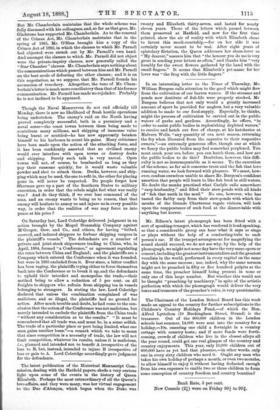In an interesting letter to the Times of Thursday, Mr.
William Burgess calls attention to the good which might flow from the cultivation of our barren waters. If the streams and ponds now destitute of fish-life were properly stocked, Mr Burgess believes that not only would a greatly increased amount of sport be provided for anglers, but a very valuable addition be made to our food-supply. Especially, he thinks, might the process of cultivation be carried out in the public waters of parks and gardens. Accordingly, he offers, "in order to assist public bodies hi replenishing depleted waters," to receive and hatch out free of charge, at his hatcheries at Malvern Wells, "any quantity of ova next season, returning the fry when liberated from the capsules to their respective owners,"—an extremely generous offer, though one at which we fancy the public bodies may feel somewhat perplexed. You must catch your ova before you can hatch them, and how are the public bodies to do this? Doubtless, however, this diffi- culty is not so insurmountable as it seems. To the execution of the scheme, as far as it concerns trout and the fish that love running water, we look forward with pleasure. We must, how- ever, confess ourselves unable to share Mr. Burgess's confident assertion that people will learn to like fish bred in still waters. No doubt the monks practised what Carlyle calls somewhere "carp-husbandry," and filled their stew-ponds with all kinds of "fish that useth in the mud." No one, however, who has tasted the flabby carp from their stew-ponds with which the monks of the Grande Chartreuse regale visitors, will look upon the reappearance of such food at the dinner-table with . anything but horror.


































 Previous page
Previous page